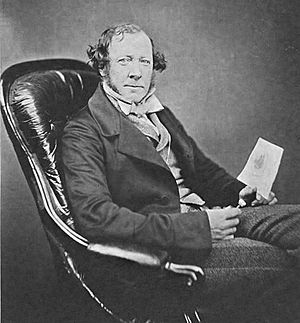Sir Philip Grey Egerton, 10th Baronet facts for kids
Sir Philip de Malpas Grey Egerton, 10th Baronet (born November 13, 1806 – died April 5, 1881) was an important English scientist who studied fossils. He was also a politician who belonged to the Conservative Party. He served in the British Parliament, known as the House of Commons, for many years until he passed away in 1881.
Contents
Early Life and Education
Philip Egerton was the son of Sir Philip Grey Egerton, 9th Baronet. He went to school at Eton College and then studied at Christ Church, Oxford University. He finished his studies in 1828. While at university, he became very interested in geology, which is the study of Earth's rocks and history. This interest grew after he attended lectures by a professor named William Buckland and met another geologist, William D. Conybeare.
In 1829, when his father died, Philip inherited the title of Baronet. A Baronet is a special British title, like a knight, that can be passed down in a family. In 1831, he became a Fellow of the Royal Society, which is a very old and respected group of scientists. He also became a trustee of the British Museum and the University of London, helping to guide these important institutions.
Discovering Ancient Life
While traveling in Switzerland, Philip Egerton met a famous scientist named Professor L. Agassiz. This meeting inspired Philip and his friend, Lord Cole, to focus on studying fossil fish. Fossils are the remains of ancient plants and animals preserved in rock.
For fifty years, Philip and Lord Cole worked hard to build two of the largest and best private collections of fossil fish. Sir Philip's collection was kept at his home, Oulton Park, in Cheshire.
Philip Egerton wrote many descriptions of new fossil fish species. His work was published in important scientific magazines and journals. Because of his great contributions to geology, he was given the Wollaston medal in 1873. This is a very high honor for geologists.
A Life in Politics
Besides his scientific work, Sir Philip Egerton was also very involved in local government and politics. He was a Deputy Lieutenant for Cheshire, which meant he helped represent the Queen in the county. He was also a Justice of the Peace, helping to keep law and order.
He was elected as a Member of Parliament for the city of Chester in 1830. An MP is someone elected to represent their area in the House of Commons. He lost his seat in 1831 but was re-elected in 1835 for Cheshire South. He continued to serve as an MP until his death in 1881.
Lasting Impact
Sir Philip Egerton's amazing collection of fossil fish is now kept at the Natural History Museum, London. This means that scientists and the public can still study and learn from his discoveries today.
He is also remembered in the names of some animals and places:
- The Rusty-fronted barwing, a type of bird, is scientifically named Actinodura egertoni.
- An ancient fossilized starfish, Palaeocoma egertoni, was also named after him.
- The Egerton Dock and Egerton Bascule Bridge in Birkenhead, England, are also named in his honor.
Family Life
On March 8, 1832, Philip Egerton married Anna Elizabeth. They had four children:
- Sir Philip le Belward Grey-Egerton, 11th Baronet (1833–1891)
- Lt-Col Rowland Grey-Egerton (1838–1923)
- Anna Mary Elizabeth Grey-Egerton ( -1927)
- Cecily Louisa Grey-Egerton ( -1920)
 | Lonnie Johnson |
 | Granville Woods |
 | Lewis Howard Latimer |
 | James West |



